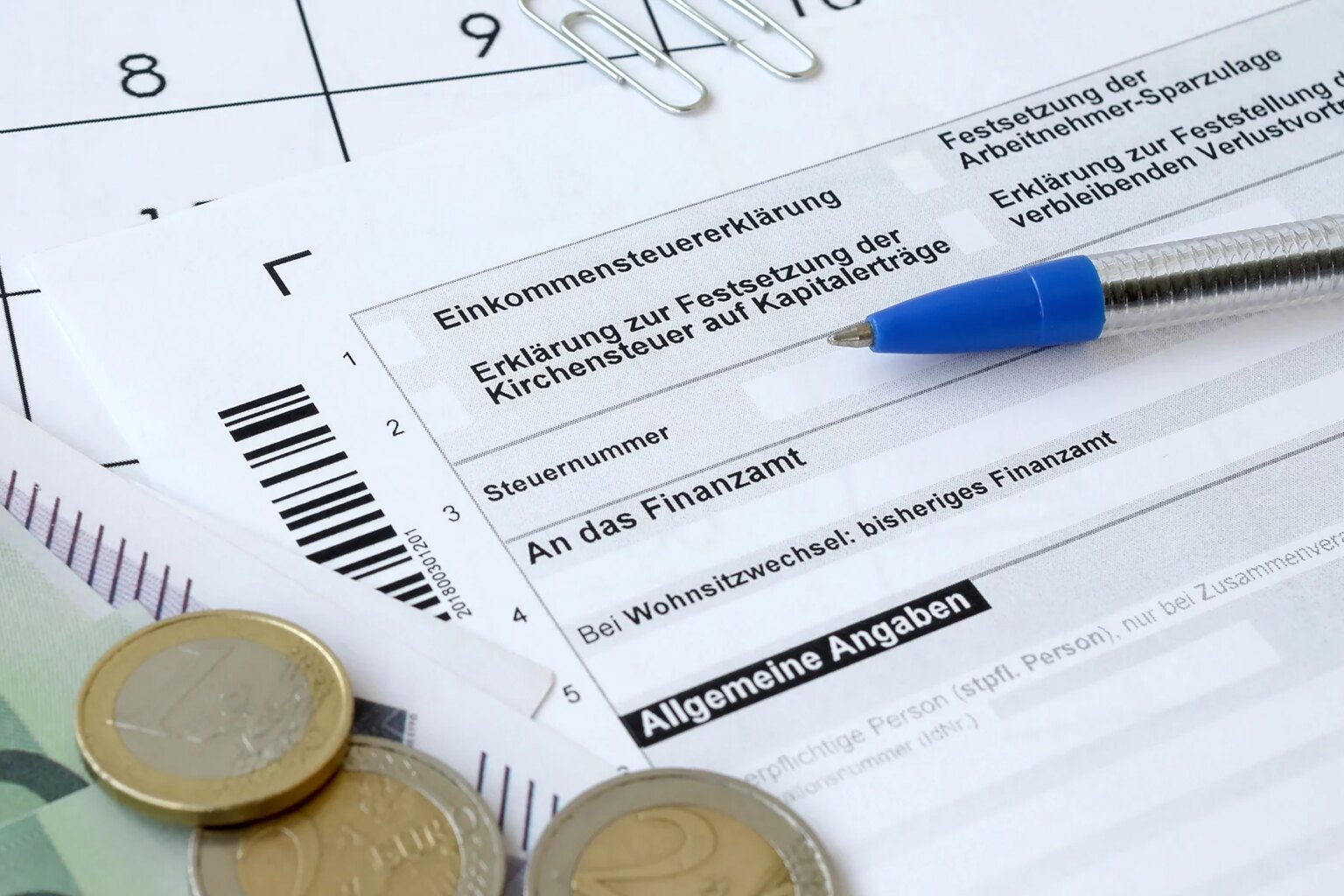In Germany, all residents and companies must pay income tax on their worldwide earnings of the previous year (1 January to 31 December). The country also levies a tax on the German earnings of non-resident foreigners. Regular salaried employees and retirees don’t have to file a tax return but may want to since many tax rebates are available.
Read on for more about how income tax works in Germany:
- Income tax in Germany: overview and latest developments
- Tax rates: how much tax will I pay in 2025?
- Who pays income tax in Germany?
- Deadlines to file a tax return in Germany
- How do you file your tax return in Germany?
- What if I don’t pay my taxes on time or at all?
- Income tax advice in Germany
- Useful resources
Wundertax
Rethink the way you do your tax returns with Wundertax. Their easy-to-use website guides expats through every step of the German tax return process, giving you more time to explore your new home. For simple and intuitive help in English, use Wundertax for your tax returns.
Income tax in Germany: overview and latest developments
Income tax (Einkommensteuer) is a mandatory levy that people and businesses in Germany pay on their earnings. The tax revenue fuels public spending, such as public healthcare, education, and social security benefits.
How much income tax you pay depends on your worldwide earnings from the previous year (i.e., your annual income). In Germany, taxable income includes:
- Your salary and other income from employment (e.g., bonuses)
- In-kind employee benefits (geldwerter Vorteil), such as the use of a company car or expat premiums
- State benefits and pensions
- Business profits
- Property, wealth, and royalties
- Interest on savings or investments
- Gains from private transactions, alimony, or annuities
- Received rent (if you rent out a home)

Some types of income (e.g., unemployment benefits and maternity leave payments) are tax-exempt but used to determine the tax rate.
In Germany, salaried employees and retirees also make national social security contributions to cover state benefits, like public health insurance, pensions, and long-term social care. These payments are not mandatory for self-employed freelancers (Freiberufler/Freiberuflerinnen). However, they won’t have access to the social care net if they haven’t made any contributions.
German employers and pension providers typically use the pay-as-you-earn (PAYE) system. This means income tax is withheld from your gross monthly earnings automatically. As such, most employees don’t need to file a tax return. However, many taxpayers still do, hoping to get a refund.
The Federal Central Tax Office (Bundeszentralamt für Steuern – BZSt) oversees Germany’s tax system on a national level. Hundreds of regional tax offices (Finanzämter) administer local taxes.
Latest news about income tax in Germany (2025)
The German government usually outlines its fiscal plans once a year. However, due to political uncertainty, the plans from 2024’s budget have rolled over into 2025. The key personal tax changes are as follows:
- The income tax threshold (steuerlicher Grundfreibetrag) has increased from €11,604 in 2024 to €12,096 in 2025.
- The government has retroactively increased 2024’s threshold from €11,604 to €11,784. This means taxpayers will be able to keep a little more of their money when they file their 2024 tax return.
- The tax return deadline has reverted to 31 July, having been adjusted in the last few years due to the pandemic.
- The total child tax allowance has increased to €9,600 in 2025, and will rise to €9,756 in 2026. The child cash benefit has increased from €250 €255.
- The thresholds for Germany’s solidarity tax for higher earners have increased. See below for further details.
Tax rates: how much tax will I pay in 2025?
Germany taxes income progressively. That means the more you earn, the higher tax rate (Steuertarif) you pay:
| 2025 tax bracket Annual income | Tax rate |
| Up to €12,096 | 0% |
| €12,097–68,429 | 14–42% |
| €68,430–277,825 | 42% |
| €277,826 and above | 45% |
| 2024 tax bracket Annual income | Tax rate |
| Up to €11,784 (previously €11,604) | 0% |
| €11,785–66,760 | 14–42% |
| €66,761–277,825 | 42% |
| €277,826 and above | 45% |
High earners in Germany pay a 5.5% solidarity surcharge (Solidaritätszuschlag – Soli) on income tax, capital gains, and corporation taxes. Historically, it was used to cover the costs of the German reunification. However, rule changes in 2021 meant the vast majority of workers are now exempt from paying.
In 2025, residents only pay the surcharge if their tax bill is over €19,950 (for individual assessments) or €39,900 (for joint assessments). This equates to a sole taxable income of €73,463 or a joint income of €146,926.

Savings and investments are also subject to federal income tax in Germany. Income from dividends and interest are taxed at a flat rate of 25%, plus a 5.5% solidarity surcharge, meaning you pay a total of 26.4%. Taxpayers can offset a standard annual deduction of €1,000.
In addition, German Protestants, Catholics, and Jews may be liable for church tax (Kirchensteuer) or worship tax (Kultussteuer). This is 8-9% of your salary, though you can deduct this amount as a special expense on your annual tax return. If you haven’t officially declared a religion during your address registration, you won’t be charged the worship tax.
To calculate the tax you owe on your wages, you can use the SteuerGo tax calculator.
Who pays income tax in Germany?
All German residents and companies must pay income tax. The exact rules for income tax vary depending on your residency status:
- Resident taxpayers (Steuerpflichtiger) are taxed on their worldwide earnings
- Non-resident taxpayers (nichtansässige Steuerpflichtiger) pay taxes on their income earned in Germany

Writer/Expert
Stephen Maunder
Cross-border commuters
Under German law, a tax resident is someone who lives more than half of the calendar year (183 days) in Germany. Therefore, cross-border commuters (Grenzgänger – i.e., those working in Germany but living elsewhere) are considered non-resident taxpayers.
Who needs to file a tax return in Germany?
Most salaried employees and pensioners in Germany don’t need to submit a tax return (Einkommensteuererklärung) as their income tax has already been withheld from their gross monthly income. If you are self-employed, however, you do have to file one since your income was initially untaxed.

Similarly, it is mandatory to submit a tax declaration if you:
- Have more than one source of income
- Earn income abroad (applies to resident taxpayers)
- Receive social security payouts (e.g., child benefits, sickness benefits, maternity pay, or unemployment benefits)
- Have gotten a divorce, and you or your ex-partner remarried the same year
- Have received a letter from the BZSt requesting you to submit a tax return
- Think you might be able to get a bigger refund. In this case, you can apply for rebates for up to four previous tax years.
That said, it’s recommended that you always double-check your tax form, even if you don’t need to file one. You may be able to apply extra deductibles (e.g., expenses incurred while repairing a home you rent out) and lower your tax bill.
German income tax for foreigners
Expat residents pay the same taxes as citizens in Germany, meaning they are taxed depending on their taxpayer status.
Non-resident taxpayers must pay tax on income derived from Germany, and will likely be paying additional taxes elsewhere. To prevent double taxation, the country has tax agreements (Doppelbesteuerungsabkommen – DBA) with nearly 90 nations around the world.

Writer/Expert
Stephen Maunder
Taxed twice?
If you’re an expat taxpayer and you happen to be taxed twice, you can apply for a refund from either Germany or the other country.
To find out more about filing taxes from abroad, please visit our country-specific articles on UK taxes and Canadian taxes.
Filing US taxes from Germany
Every US citizen and Green Card holder must file a tax return with the IRS, even those living abroad. Many US expats are unaware of this obligation, assuming that, as expats, they don’t need to file or pay taxes in the US. The good news is that as long as you’re paying taxes in another country, you usually don’t owe anything to the IRS, but it’s essential to make sure, and the law says you still have to file.
Learn how to file your US tax returns from Germany by reading our article on taxes for American expats. Alternatively, you can seek advice from a company that offers a specialized tax filing service for expats, such as H&R Block.
H&R Block
Filing U.S. taxes from Germany? H&R Block’s expat tax experts simplify the process with easy online registration and remote filing. Whether it’s answering tricky tax questions or managing paperwork, they’ve got you covered. Stay compliant, stress-free, and up-to-date – contact H&R Block today.
Who is exempt from German income tax?
Residents whose income is below the tax-free personal allowance (€12,096 in 2025) do not have to pay income tax in Germany. This threshold can increase depending on your situation.

For instance, some people with disabilities and their carers can claim increased living expenses for tax purposes from their competent tax office.
Deadlines to file a tax return in Germany
Germany’s tax year runs from 1 January to 31 December. Tax returns for the 2024 calendar year are due on 31 July 2025. If your return is prepared by a tax consultant, income tax assistance association, or other authorized persons, it must be filed by 30 April 2026.
Future deadlines and due dates for German income tax are:
- For tax year 2025, the submission deadline is 31 July 2026. If done by a tax consultant or authorized person, your return is due on 28 February 2027.
How do you file your tax return in Germany?
The most convenient way for residents to complete their tax forms (Mantelbogen) is online through the BZSt’s Mein ELSTER portal. However, if you prefer, you can also download and print a paper return and submit it to your local tax office.
Regardless of which method you choose, you must first identify your tax class (Steuerklasse). This is largely dependent on your marital status and should have been automatically assigned to you by the authorities when you first registered for tax. The tax classes are as follows:
| Tax class | Status |
| Steuerklasse 1 | Single, widowed, divorced, long-term separated |
| Steuerklasse 2 | Single parent |
| Steuerklasse 3 | Married with a higher income than a partner in Class 5 |
| Steuerklasse 4 | Married with equal income |
| Steuerklasse 5 | Married with a lower income than a partner in Class 3 |
| Steuerklasse 6 | Second job or tax deduction |
Married couples and registered partners qualify as fiscal partners (Steuerpartner) and may file a joint tax return. One of the benefits of this is that you can double the basic tax-free allowance (i.e., €24,192 in 2025).

You must also have a tax identification number (Steueridentifikationsnummer or Steuer-ID). The tax authorities will automatically assign you this 11-digit ID number when you register your address in Germany.
Freelancers and entrepreneurs require an additional freelance tax number (Steuernummer) to record and monitor their VAT liability. This number will be provided when you register your company.
Deductibles and tax relief
Germany offers plenty of ways to save on your income tax bill. For example, the first €12,096 (or €24,192 for joint tax returns) is tax-free.
Other available tax deductions (Steuerlich absetzen) include advertising expenses (Werbungskosten), working expenses (Betriebskosten), special expenses (Sonderausgaben), and extraordinary expenses (außergewöhnliche Belastungen).
Advertising and working expenses are income-related business costs, such as commute/travel expenses, home office work equipment, training courses, and work clothes. Landlords may also deduct expenditures they incurred on their rental home (e.g., maintenance costs). These deductions are capped at €1,230 a year.
The German tax authorities allow you to deduct up to €13,805 in special expenses, for example:
- Various insurance premiums and social security contributions
- Private pension schemes
- Alimony payments to ex-partners
- Child-related costs: up to €4,800 per child per year
- Costs for your or your partner’s vocational training
- Initial educational expenses (Erstausbildung), such as tuition fees: up to €6,000 per year
- Church or worship tax
- Charitable donations: up to 20% of your gross income

Depending on your situation, you may also deduct up to €12,096 in extraordinary expenses. These are mandatory costs you incurred for legal, moral, or factual reasons and which could not have been avoided. For example:
- Medical expenditure (Krankheitskosten), including the cost of an outpatient caregiver and travel costs to see the doctor or pharmacy
- Education allowance of an adult child (additional requirements apply)
- Funeral costs that cannot be covered by the inheritance or other compensation
- Replacement costs (e.g., expenses you incurred due to a fire or flood)
If you had any losses or debts during the year, you can carry them forward to subsequent years and deduct them without limitation, up to a total income of €1 million. The deduction of losses that exceed this amount is restricted: the excess can be deducted up to 60% of the total earnings.
Tax allowances for self-employed income
In Germany, freelancers and self-employed entrepreneurs can benefit from the same tax allowances as other workers, including the deduction of income-related business costs.
In addition, they may offset an extra €2,800 for any health insurance-related costs.
How do I pay or get a refund of my income tax?
The final assessment from the central tax office will be sent two to six months after you submit your return.
If you owe any income tax, you must pay it within one month of receiving the definitive assessment. You can also pay in quarterly installments, due in March, June, September, and December. The most common form of payment is direct debit; however, you can also pay by bank transfer or check.

If you’re getting a tax refund, your rebate will be directly deposited in your bank account.
What if I don’t pay my taxes on time or at all?
If you cannot file your return or pay your taxes on time, you should get in touch with the tax office as soon as possible. In many situations, they can offer you an extension of the deadline and help organize a payment plan.
Depending on your (in)action, Germany’s tax fines and penalties include:
- Individuals filing their taxes late are fined 0.25% of the amount owed
- Companies filing their corporate tax return late face a fine of up to 10% of the tax due (up to a maximum of €25,000)
- Late payments incur a penalty of 1% of the amount owed each month
Deliberately withholding information from or providing incorrect information to the authorities can be classed as tax avoidance. This crime is punishable by hefty fines or imprisonment (up to five years). The most severe cases can even lead to up to 10 years in prison.
Income tax advice in Germany
Doing your taxes in Germany can be challenging, especially if you’re still new to the system. While this article provides a general overview, you should always get professional advice from a financial expert regarding your individual tax situation.
Fortunately, Germany has many accountants and tax experts who offer expat-friendly, English-speaking services, including:
If you’re a freelancer or business owner, you can also use an online platform like Finom to manage your corporate taxes. Similarly, trade bodies such as the International Federation of Accountants can help you find a tax advisor in Germany.
Useful resources
- Bundeszentralamt für Steuern – official website of the Federal Central Tax Office in Germany
- Find your local tax office – search function at the BZSt







